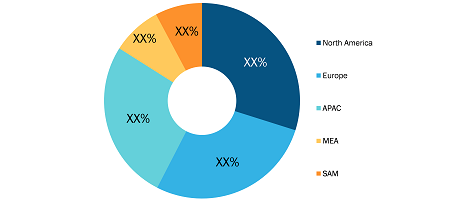Rising Adoption of Pharma 4.0 to Drive Smart Life Sciences Manufacturing Market during 2023-2033
According to our latest market study on "Smart Life Sciences Manufacturing Market Forecast to 2033 – COVID-19 Impact and Global Analysis – by Component, Technology, and Application," the market is expected to grow from US$ 18,649.50 million in 2022 to US$ 78,974.61 million by 2033; it is anticipated to record a CAGR of 14.4% from 2023 to 2033.
Smart life sciences manufacturing, often known as Pharma 4.0, aims to provide practical guidance, embed regulatory best practices, and accelerate Pharma 4.0 transformations. The main goal is to allow organizations participating in the pharmaceutical product lifecycle to control the full potential of digitalization and provide faster therapeutic innovations and improved production processes for the benefit of end-users. These changes will bring huge opportunities to life science manufacturers in the coming years. Advanced automation solutions, modern cloud-based manufacturing execution systems, augmented reality (AR), and cybersecurity are among the major aspects of Pharma 4.0. The goal of Pharma 4.0 is to achieve safer pharmaceutical production with greater efficiency along with the whole value chain. It is a highly efficient automated process driven by an integrated manufacturing control strategy. COVID-19 pandemic underlined the insufficiency of paper-based processes in the manufacturing sector across the world. Companies in this sector are looking for having real-time visibility into production processes. The pharmaceutical industry has noticed improvements after the implementation of digital and automation technologies. These factors collectively drive the smart life sciences manufacturing market growth globally.
Smart Life Sciences Manufacturing Market Share — by Geography, 2022
Smart Life Sciences Manufacturing Market Forecast to 2033 - COVID-19 Impact and Global Analysis by Component (Solutions and Services), Technology [AR/VR Systems, Internet of Things (IoT), Artificial Intelligence (AI), Cybersecurity, Big Data, and Others], and Application (Pharma, Bio-Pharma, and Medical Device)
Smart Life Sciences Manufacturing Market Strategies by 2033
Download Free Sample
Asia Pacific is one of the fastest developing regions. The smart life sciences manufacturing market in the region is segmented into China, Japan, India, Australia, South Korea, and the Rest of Asia Pacific. The presence of rapidly growing countries is likely to create ample opportunities for smart life sciences manufacturing market players in Asia Pacific in the coming years. The developing healthcare industry; rising collaborations among market players; and increasing implementation of advanced technologies such as artificial intelligence, augmented reality, virtual reality, big data analytics, and others by manufacturers are likely to drive the smart life sciences manufacturing market growth in the region during the forecast period.
Key stakeholders in the smart life sciences manufacturing market are hardware providers, software providers, technology enablers, regulatory bodies, system integrators/service providers, and the life sciences industry. The demand for various hardware and software solutions, along with digital transformation services, has increased in the life sciences industry due to the large-scale adoption of Pharma 4.0 in recent years. Hardware providers supply sensors, controllers, and various other components, which allow for the digital transformation of the life sciences manufacturing plants. Software providers supply various solutions that facilitate connections between hardware components and aid in data collection and storage in life sciences manufacturing plants. Technology enablers play a crucial role in the rising adoption of Pharma 4.0 solutions, as they provide platforms to host different solutions. Regulatory bodies ensure that the solutions being used in life sciences research and manufacturing comply with regulations. System integrators/service providers are third parties that aid in developing, customizing, integrating, and maintaining different smart manufacturing solutions in pharmaceutical and medical device manufacturing plants and laboratories. The life sciences industry is the end user of the various solutions and services pertaining to smart manufacturing.
The smart life sciences manufacturing market is segmented on the basis of component, technology, and application. Based on component, the market is bifurcated into solutions and services. By technology, the smart life sciences manufacturing market is segmented into Augmented Reality/Virtual Reality (AR/VR) systems, Internet of Things (IoT), artificial intelligence (AI), cybersecurity, big data, and others. Based on application, the smart life sciences manufacturing market is segmented into pharma, bio-pharma, and medical device. IoT segment commanded the largest smart life sciences manufacturing market share in 2022.
ABB Ltd, Bosch Rexroth AG, Emerson Electric Co, Fortinet Inc, General Electric Co, Honeywell International Inc, IBM Corporation, Rockwell Automation, Siemens AG, and Sophos Group plc are among the key players profiled during this market study. In addition to these players, several other essential smart life sciences manufacturing market players were studied and analyzed to get a holistic view of the global market and its ecosystem.
Contact Us
Phone: +1-646-491-9876
Email Id: sales@theinsightpartners.com